Publishing Studies
This educational program is specialized in training qualified professionals in the field of publishing. It aims to develop practical skills necessary for the publishing and printing industries, including editing, copyright, design, and the production of both printed and electronic publications. The program helps students enrich their linguistic knowledge, understand the processes of scientific-technical and literary publishing, as well as acquire specialized knowledge on utilizing modern publishing technologies.
The curriculum covers the fundamental principles of publishing, text editing, design of printed and electronic publications, terminology management, and cultural differences in publishing practices. Through practical training, students gain hands-on experience in editing, layout design, and preparation of literary, scientific, technical, and media texts for publication.
Head of Department:
Botir Elov – PhD in Technical Sciences, Associate Professor
Form of Education:
Four-year full-time education
Program Structure:
This program comprises a total of 169 credits.
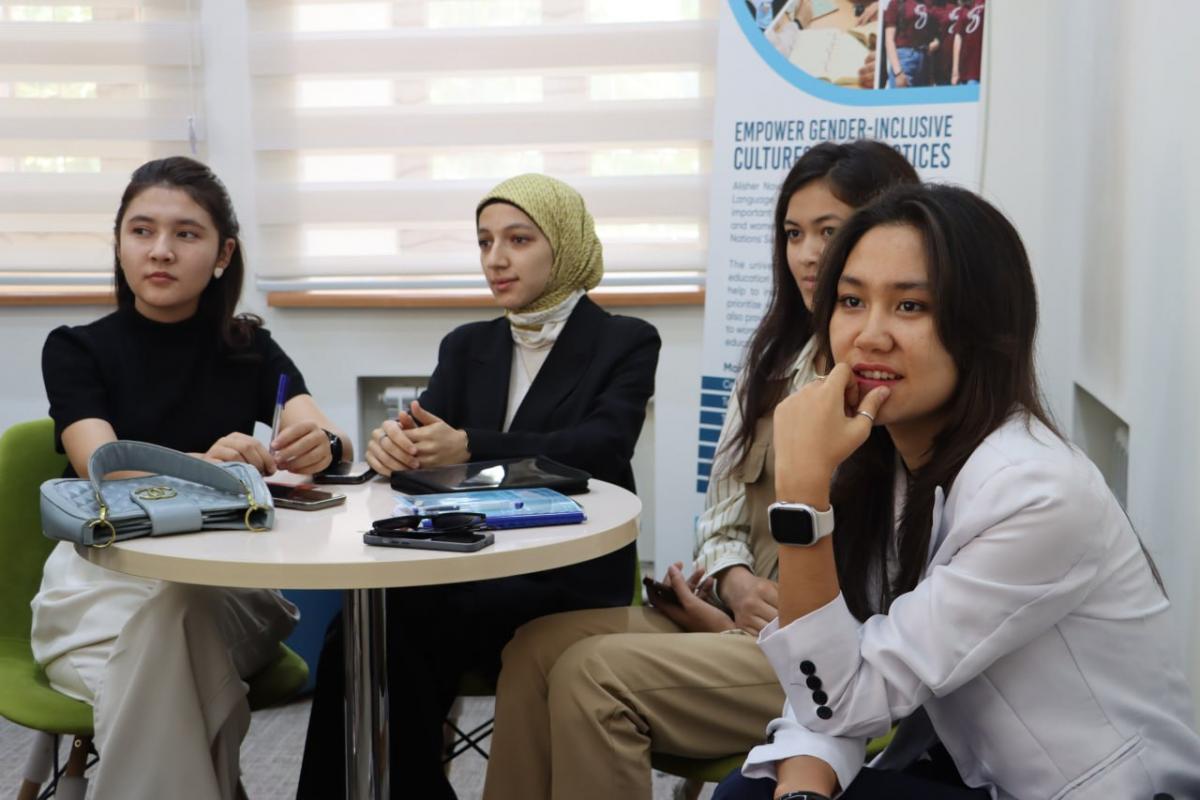
Modular Learning
Launching in 2025
Alisher Navoi Tashkent State University of Uzbek Language and Literature (TSUULL) is set to introduce modular learning at the University starting in 2025, offering a flexible and innovative approach to education.
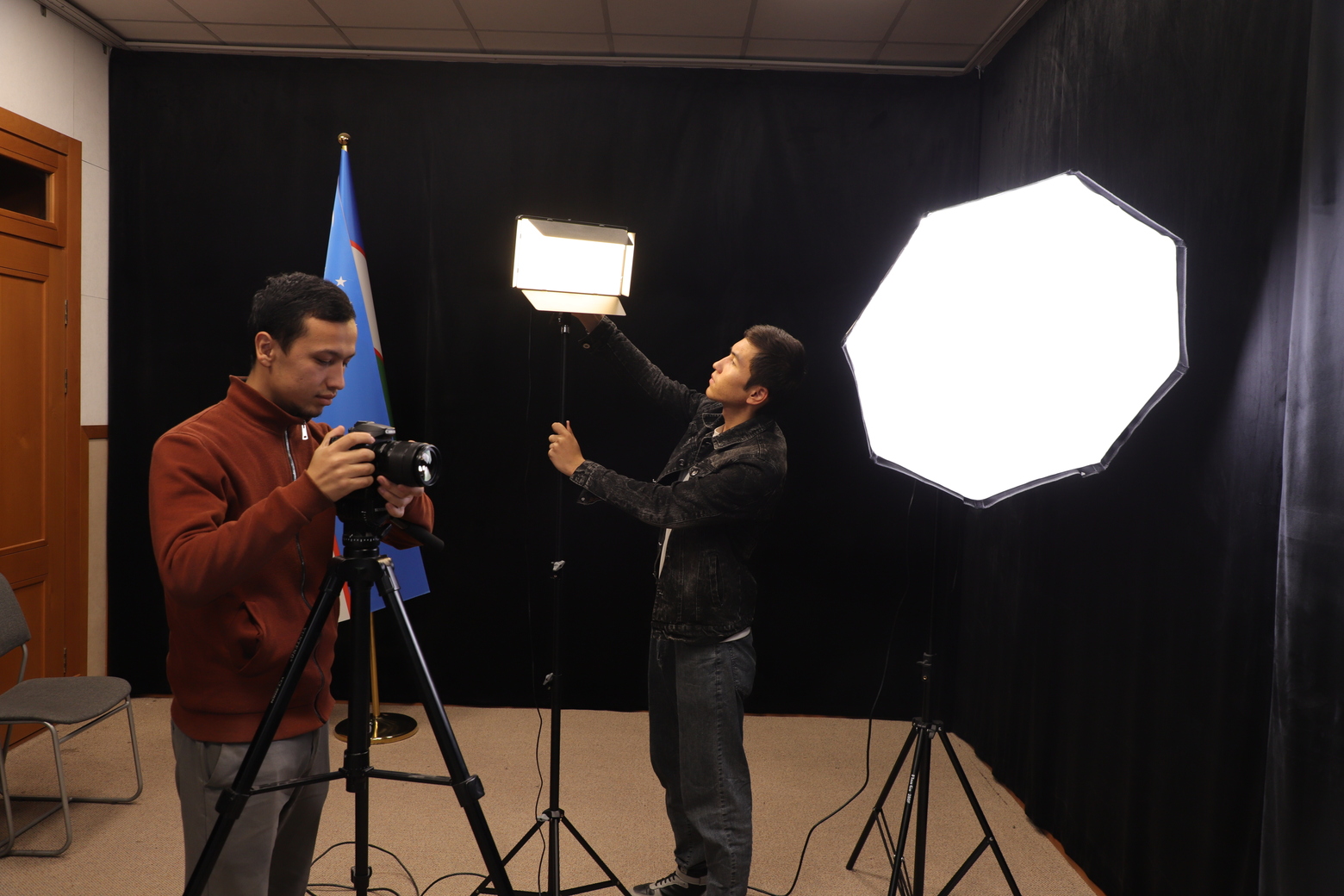
This program aims to develop creativity, critical thinking, and skills for effective text editing and organizing publishing activities. It also provides a solid foundation for students to succeed in publishing and editing, the printing industry, media and communication, advertising and PR, and both electronic and print publishing fields.
The program enables graduates to effectively work in publishing activities, editing, content creation, and media and communication fields. The curriculum includes valuable knowledge in sociology, history, and cultural studies, offering students an in-depth understanding of complex aspects of text editing, publishing processes, and the media industry.
This course introduces students to the information technologies widely used in the modern publishing and printing industries and helps them develop skills for their effective application. The subject aims to prepare publishing specialists to work with contemporary digital technologies, enhance their professional competence, and ensure their competitiveness in the labor market.
This subject provides up-to-date knowledge related to terminology, aiming to develop initial understanding, skills, and competencies in field-specific terms for future teachers of Uzbek language and literature. It focuses on forming their professional abilities in line with occupational standards and ensuring that they master the subject at a level that meets modern educational requirements.
This subject provides theoretical knowledge, skills, and competencies in the fundamental issues of text linguistics—a field that bridges literary studies and linguistics—at the undergraduate level. It also aims to educate the younger generation in line with recent governmental decisions and decrees promoting the study of ancient manuscript sources, and to lay the foundation for future scientific research. The theory of text linguistics is studied in parallel with manuscript and lithographic texts.
The aim of teaching philosophy is to familiarize students with the foundations of philosophical thinking, develop their critical and logical reasoning skills, and shape their worldview. The course also prepares students to think logically and independently, approach life problems from a broad perspective, and acquire deep knowledge about humans and society.
This course develops students' understanding of the principles, technical and software infrastructure, and capabilities of modern web technologies. It also builds professional-level web design skills relevant to their field of specialization, including the ability to use ready-made software tools effectively.
This course covers the formation of the modern Uzbek language and its phonological, lexical, phraseological, morphological, and syntactic levels and their characteristics. Students learn to analyze language units from phonological, lexical, phraseological, morphemic, word formation, morphological, and syntactic perspectives.
This subject introduces students to the various problematic aspects that have arisen in the writing systems of the modern Uzbek literary language, particularly in its orthography and graphics. It aims to develop students' creative approach to discussing and resolving controversial issues in spelling.
This course provides information about the history, types, classifications, and technological foundations of publishing. It is designed to build students’ foundational knowledge of publishing.
This course explains the goals, objectives, and main directions of the New Uzbekistan Strategy. It focuses on understanding the essence of processes such as increasing the well-being of the population based on the principle of “For the dignity of man,” transforming economic sectors, rapidly developing entrepreneurship, unconditionally ensuring human rights and interests, and improving an active civil society. The course also aims to foster a sense of personal responsibility in implementing these reforms.
This subject focuses on working with modern graphic editors, creating and manipulating graphic objects, and developing professional design skills related to the field. It also helps students build proficiency in using graphic editing software effectively.
This subject forms general understanding of physical fitness, sports training, and wellness-related sciences. Key areas include exercise physiology, sports psychology, biomechanics, coaching techniques, and sports management.
This course focuses on the principles of multimedia technologies, their technical and software infrastructure, and capabilities. It aims to develop students’ digital skills in the field of specialization, including the ability to effectively use ready-made software tools.
The aim of this course is to familiarize students with the system and language of print media in Uzbekistan. It teaches the methods and principles of disseminating information through newspapers, magazines, and other printed publications.
This course builds knowledge about the principles of text creation and recreation, as well as the distinctive features of text editing. Students are introduced to editing methodologies and learn to edit texts according to literary language norms, stylistic and genre requirements. It also develops skills in preparing texts for publication, revising content, and ensuring consistency between form and meaning.
The aim of teaching Religious Studies is to introduce students to the origins, development, core doctrines, and social roles of various religions. This subject explains how religious beliefs have influenced human thought and culture, and contributes to the formation of religious tolerance and a culture of dialogue. Students will gain in-depth knowledge of the theoretical foundations of religious studies, including topics such as religion and science, religion and politics, and religion and ethics. This process enhances their critical thinking skills and helps them understand the interrelation between religious traditions and modern society.
The goal of teaching this subject is to equip students with the necessary skills for preparing documents, communication, and administrative tasks in the state language. The subject covers the following objectives: 1) Document Preparation in the State Language – Developing skills in preparing official documents, letters, requests, protocols, decisions, and other written materials in the state language. 2) Official and Informal Communication – Using proper and precise language in official communication between government institutions and organizations, adhering to language norms. 3) Presentation of Information in the State Language – Effectively and clearly presenting information in the state language, establishing efficient communication with the audience. 4) Culture of Written and Oral Speech – Developing professional and culturally appropriate speech in the state language, ensuring clear, fluent, and accurate language use. 5) Legal and Organizational Administrative Procedures – Complying with legal and regulatory requirements in official documents and administrative processes conducted in the state language.
This subject focuses on learning how to address diversity in works on a specific topic, correct spelling and grammatical errors, as well as stylistic and logical shortcomings.
This course aims to ensure that the Uzbek language occupies a prominent position in the global information network. It focuses on understanding how to create and process multimedia software tools in Uzbek and other leading foreign languages, and equips students with the skills to use these tools effectively in various formats.
By studying literary works that reflect important poetic and aesthetic aspects of world literature, this course demonstrates the theoretical and artistic evolution of philosophical views. It also highlights the role and significance of literary history and literary-critical thinking in the life of individuals and society. The course enhances students’ literary and aesthetic thinking, encourages scientific reflection, and develops skills in theoretical analysis and interpretation, fostering a spirit of creativity and responsibility.
This course focuses on the principles of operation, technical and software infrastructure, and capabilities of publishing systems. It aims to develop online publishing skills and proficiency in using ready-made software tools related to the field of specialization.
This subject aims to improve students' listening comprehension, reading, speaking, and writing skills in English. It also focuses on developing translation skills and applying them in practice. Through theoretical knowledge and practical skills, the course helps shape a scientific worldview and provides students with a methodological approach to processes in various fields of society.
This subject introduces students to the various stylistic features of the Uzbek language, helping them develop skills for clear and logical expression. It also focuses on enhancing written and spoken language culture. The course equips students with the ability to effectively use the Uzbek language in professional environments, ensuring that texts are stylistically correct and impactful, and providing the necessary knowledge and skills for editorial work.
This course teaches students how to create mobile applications for any operating system using the Thunkable platform, without writing code. It develops the skills and proficiency to use ready-made software tools for mobile app development.
The aim of teaching this subject is to familiarize students with the legal regulations, laws, and procedures related to publishing activities. It also focuses on developing the necessary knowledge and skills to address legal issues that arise during the publishing process.
The aim of teaching the subject of management and marketing in publishing is to equip students with the knowledge and skills necessary to develop and implement effective management and marketing strategies in the publishing and printing industry. Additionally, the course prepares students to work successfully in the publishing industry, manage businesses, promote published products in the market, and make effective decisions using management and marketing principles.
Career Opportunities
This program is designed to develop skills in creativity, critical thinking, as well as in effective organization of text editing and publishing processes. It also provides a solid foundation for students to pursue successful careers in publishing and editing, the printing industry, media and communications, advertising and PR, as well as in digital and print publications. Graduates of the program will be well-equipped to work effectively in publishing, editing, content creation, and media and communication fields. Moreover, the curriculum includes valuable knowledge from sociology, history, and cultural studies, offering students a deep understanding of text editing, publishing processes, and the complex aspects of the media industry.
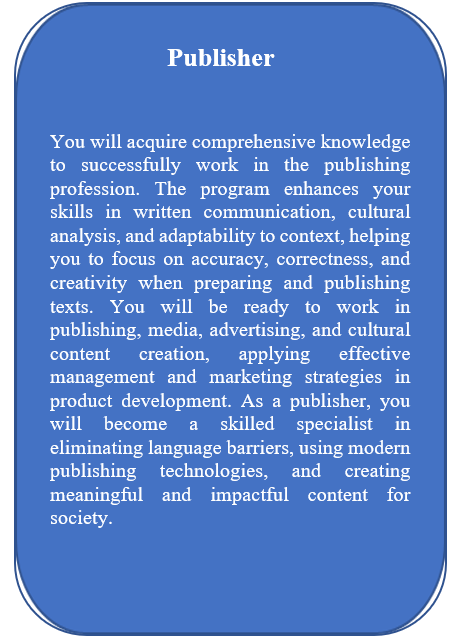
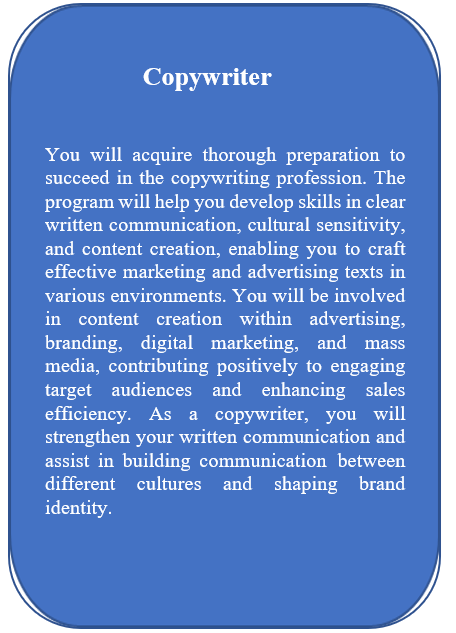
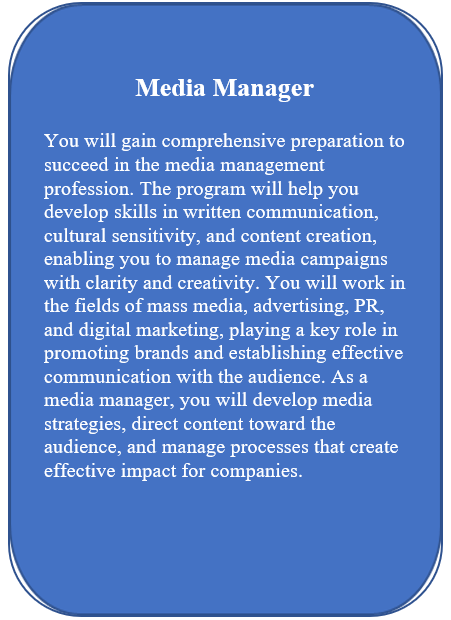
Indicative annual fee
$2000*
This indicative annual fee is based on one year study load of 28 credits
If you are a local student, you can apply through our TSUULL Application system which is free of charge.
Local students are:
• Uzbekistan Citizens
• Karakalpakistan Citizens
• Uzbekistan permanent residents
• Karakalpakistan permanent residents
Scholarships
At Alisher Navo‘i Tashkent State University of Uzbek Language and Literature, we are proud to offer a range of scholarships that acknowledge students with a deep commitment to the Uzbek language, literature, and culture. Our scholarships reward those who demonstrate academic excellence, active engagement within their communities, and outstanding leadership. Through donor-funded support, we also ensure that scholarships are accessible to students based on their academic achievements and financial needs. Additionally, specific scholarships are available for degrees in translation, linguistics, and Uzbek literature, fostering excellence and dedication to advancing Uzbek language and literature studies.
FIND OUT MORE
1. How long is the bachelor’s program?
The bachelor’s program is 4 years (full-time). Students complete a structured curriculum that builds on foundational courses in language and literature while allowing for specialization in later years.
2. How are assessments conducted?
Assessment in TSUULL's bachelor’s programs is diverse and may include exams, portfolios, project work, fieldwork, and practical tasks. The programs focus on authentic assessments to reflect real-world applications, with many tasks designed to develop essential skills like critical thinking, research, and time management. Additionally, teachers offer individual support through small, interactive classes, ensuring students have ample guidance throughout their studies.
3. Can I transfer between bachelor’s programs?
Yes, TSUULL allows students to transfer between bachelor’s programs. In the first year, students explore core subjects common across programs, which gives them a strong foundation and the flexibility to switch if they discover another program that better suits their goals. Credit for completed courses is generally transferable, so no time is lost.
4. What career opportunities are available after graduation?
A TSUULL bachelor’s degree opens doors to careers in education, translation, international relations, cultural institutions, and more. Graduates often find roles in translation and interpretation, publishing, media, and tourism, with their language skills and cultural knowledge highly valued by employers worldwide.
5. Are there scholarships available for foreign students?
Yes, TSUULL offers scholarships for international students based on academic performance and other achievements. Students interested in scholarships should apply early and check with the admissions office to understand the specific requirements and availability.
6. Does TSUULL offer internship or study abroad opportunities?
TSUULL has partnerships with universities and institutions abroad, allowing students to participate in exchange programs and internships. These opportunities provide valuable experience in different cultural and linguistic settings, often aligning with students’ studies and future career goals.
TSUULL has been included in the QS World University Rankings 2025, earning a spot in the 301–350 range in the Modern Languages category.
This recognition reflects the university’s strong performance in areas such as academic reputation, employer opinion, research output, and international collaboration.